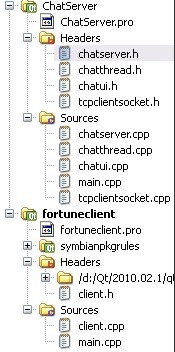Qt tcp/ip 通信
来源:互联网 发布:blingbling软件 编辑:程序博客网 时间:2024/04/29 05:26
折腾了很久TCP IP通信机制。
以前虽然看过bsd tcp/ip的so called 基础通信代码。什么bind, listen ,accept , receive, write, read,但是一直没真正理解。
这次由于公司需求,我狠狠地读了代码,并且搬出QT老本行,开始了QT For windows的编程。
这个大体构架是做一个聊天室软件。
每个client都可以给服务器TCP发消息,服务器通过TCP给各个客户端转发消息。
服务器端代码:
Server.cpp 继承 QTcpServer 主要用来listen to some port , 侦听到端口后, 继承重写了incomingConnection函数,来new 如下的一个代码
tcpClientSocket.cpp 这个继承QTcpSocket ,用来 server.cpp里被 New 出来,接受各种请求
它重写了函数dataReceived , 即各种客户端发来的请求数据,(注意,这个不是第一步的connect状态,这个是业务逻辑上得请求,比如我给server发送了“你好” ) 。
这一步处理好后,便开始给各个客户端分发同样的消息“你好” 。使用方法,很简单,QTcpSocket的write方法即可。
这里的细节重点是,在server.cpp里,每个new出来的TcpClientSocket的指针,我放到一个QLIST< TcpClientSocket * >模板里。这样,只要你不删去这个节点,这个TCP链接就一直存在,嘿嘿,神奇吧。
刚开始我看QT自带example ,fortuneclient and threaded fortune server;我试图着在example的基础上修改代码,一步步达到目的。结果发现他的业务逻辑,总是write后就自动disconnected, 我以为不disconnected,就能长链接,结果总是出错。
我一直纳闷,这是为什么呢?我用了个List保存了socket的descriptor,以为留着套接字的描述符,就可以下次再调出来用用。实际呢,必须创建链路的时刻,就保存指针。TCP链接,指针在,链路在。指针亡,链路亡。
这也验证了我的想法,所谓一个真正的通信链路SOCKET的创建,是这样执行下去的。在APP层,我们调用了connect,实际OS对网卡发送了连接对方的信号,这个电子,一路走过去,直到accept , 这一个链路创建了,在网卡开辟了区域了,在系统OS也开辟了内存,两方都为此一直保持着这段数据的存在,指针即维系一个网络TCP链路的关键。
这就意味着,客户端无需写什么侦听代码来接受服务器端的消息,直接保持那个链路,消息自然就可以发过来,触发dataReceived信号。
写完代码后,我测试了一下,3个客户端同时链接TCP服务器端的5566端口,全部成功。
曾经很纠结我的所谓端口只能被一个占用。看来,理论远不如实际来的直接。
最后,我还是贴个代码吧。我知道,当一个人寻找各类消息的时候,代码总是最先看得,谁喜欢看人家博客唠叨半天,不讲大道理啊!
服务器端:
代码结构直接看插图

chatserver.h
*********************
#ifndef CHATSERVER_H
#define CHATSERVER_H
#include <QTcpServer>
#include <QStringList>
#include "tcpclientsocket.h"
class ChatServer : public QTcpServer
{
Q_OBJECT
public:
ChatServer(QObject *parent = 0,int port=0);
void PushMessage();
QList<TcpClientSocket*> tcpClientSocketList;
signals:
void updateServer(QString,int);
public slots:
void updateClients(QString,int);
void slotDisconnected(int);
protected:
void incomingConnection(int socketDescriptor);
private:
QStringList fortunes;
int onlineDescriptor;
};
#endif // CHATSERVER_H
*********************
chatserver.cpp
*********************
#include "chatserver.h"
#include "chatthread.h"
#include <stdlib.h>
ChatServer::ChatServer(QObject *parent,int port)
: QTcpServer(parent)
{
fortunes << tr("Searching for people...")
<< tr("You've find a people. Try say hello!")
<< tr("You've disconnected.");
listen(QHostAddress::Any,port);
}
void ChatServer::incomingConnection(int socketDescriptor)
{
TcpClientSocket *tcpClientSocket=new TcpClientSocket(this);
connect(tcpClientSocket,SIGNAL(updateClients(QString,int)),this,SLOT(updateClients(QString,int)));
connect(tcpClientSocket,SIGNAL(disconnect(int)),this,SLOT(slotDisconnected(int)));
tcpClientSocket->setSocketDescriptor(socketDescriptor);
tcpClientSocketList.append(tcpClientSocket);
/*
onlineDescriptor=socketDescriptor;
QString fortune = fortunes.at(qrand() % fortunes.size());
// QString fortune = fortunes.at(0);
ChatThread *thread = new ChatThread(socketDescriptor, fortune, this);
connect(thread, SIGNAL(finished()), thread, SLOT(deleteLater()));
thread->start();
*/
}
void ChatServer::updateClients(QString msg, int length)
{
// emit updateServer(msg,length);
for(int i=0;i<tcpClientSocketList.count();i++)
{
QTcpSocket *item=tcpClientSocketList.at(i);
if(item->write(msg.toLatin1(),length)!=length)
{
continue;
}
}
}
void ChatServer::slotDisconnected(int descriptor)
{
for (int i=0;i<tcpClientSocketList.count();i++)
{
QTcpSocket *item=tcpClientSocketList.at(i);
if(item->socketDescriptor()==descriptor)
{
tcpClientSocketList.removeAt(i);
return;
}
}
return;
}
void ChatServer::PushMessage()
{
QString testString;
testString="fuck u";
updateClients(testString,testString.length());
/*
ChatThread *thread = new ChatThread(onlineDescriptor, testString, this);
connect(thread, SIGNAL(finished()), thread, SLOT(deleteLater()));
thread->start();
*/
}
*********************
chatui.h
*********************
#ifndef CHATUI_H
#define CHATUI_H
#include <QDialog>
#include "chatserver.h"
QT_BEGIN_NAMESPACE
class QLabel;
class QPushButton;
QT_END_NAMESPACE
class ChatUi : public QDialog
{
Q_OBJECT
public:
ChatUi(QWidget *parent = 0);
private slots:
void Test();
private:
QLabel *statusLabel;
QPushButton *quitButton;
QPushButton *testButton;
ChatServer *server;
};
#endif // CHATUI_H
*********************
chatui.cpp
*********************
#include "chatui.h"
#include "chatserver.h"
#include <QtGui>
#include <QtNetwork>
#include <stdlib.h>
ChatUi::ChatUi(QWidget *parent)
:QDialog(parent)
{
statusLabel = new QLabel;
quitButton=new QPushButton(tr("Quit"));
quitButton->setAutoDefault(false);
testButton=new QPushButton(tr("Test"));
testButton->setAutoDefault(false);
server=new ChatServer(this,5566);
if (!server->isListening()) {
QMessageBox::critical(this, tr("Chat Server"),
tr("Unable to start the server: %1.")
.arg(server->errorString()));
close();
return;
}
QString ipAddress;
QList<QHostAddress> ipAddressesList = QNetworkInterface::allAddresses();
for (int i = 0; i < ipAddressesList.size(); ++i) {
if (ipAddressesList.at(i) != QHostAddress::LocalHost &&
ipAddressesList.at(i).toIPv4Address()) {
ipAddress = ipAddressesList.at(i).toString();
break;
}
}
if (ipAddress.isEmpty())
ipAddress = QHostAddress(QHostAddress::LocalHost).toString();
statusLabel->setText(tr("The server is running on/n/nIP: %1/nport: %2/n/n"
"Run the Fortune Client example now.")
.arg(ipAddress).arg(server->serverPort()));
connect(quitButton,SIGNAL(clicked()),this,SLOT(close()));
connect(testButton,SIGNAL(clicked()),this,SLOT(Test()));
QHBoxLayout *buttonLayout = new QHBoxLayout;
buttonLayout->addStretch(1);
buttonLayout->addWidget(quitButton);
buttonLayout->addStretch(1);
buttonLayout->addWidget(testButton);
buttonLayout->addStretch(1);
QVBoxLayout *mainLayout = new QVBoxLayout;
mainLayout->addWidget(statusLabel);
mainLayout->addLayout(buttonLayout);
setLayout(mainLayout);
setWindowTitle(tr("Chat Server"));
}
void ChatUi::Test()
{
server->PushMessage();
}
*********************
tcpclientsocket.h
*********************
#ifndef TCPCLIENTSOCKET_H
#define TCPCLIENTSOCKET_H
#include <QTcpSocket>
class TcpClientSocket : public QTcpSocket
{
Q_OBJECT
public:
TcpClientSocket(QObject* parent=0);
~TcpClientSocket();
signals:
void updateClients(QString,int);
void disconnected(int);
protected slots:
void dataReceived();
// void slotDisconnected();
};
#endif // TCPCLIENTSOCKET_H
*********************
tcpclientsocket.cpp
*********************
#include "tcpclientsocket.h"
TcpClientSocket::TcpClientSocket(QObject* parent)
{
connect(this,SIGNAL(readyRead()),this,SLOT(dataReceived()));
connect(this,SIGNAL(disconnected()),this,SLOT(slotDisconnected()));
}
TcpClientSocket::~TcpClientSocket()
{
}
void TcpClientSocket::dataReceived()
{
while(bytesAvailable()>0)
{
char buf[1024];
int length=bytesAvailable();
read(buf,length);
QString msg=buf;
emit updateClients(msg,length);
}
}
*********************
下面是客户端代码
client.h
*********************
/****************************************************************************
**
** Copyright (C) 2010 Nokia Corporation and/or its subsidiary(-ies).
** All rights reserved.
** Contact: Nokia Corporation (qt-info@nokia.com)
**
** This file is part of the examples of the Qt Toolkit.
**
** $QT_BEGIN_LICENSE:LGPL$
** Commercial Usage
** Licensees holding valid Qt Commercial licenses may use this file in
** accordance with the Qt Commercial License Agreement provided with the
** Software or, alternatively, in accordance with the terms contained in
** a written agreement between you and Nokia.
**
** GNU Lesser General Public License Usage
** Alternatively, this file may be used under the terms of the GNU Lesser
** General Public License version 2.1 as published by the Free Software
** Foundation and appearing in the file LICENSE.LGPL included in the
** packaging of this file. Please review the following information to
** ensure the GNU Lesser General Public License version 2.1 requirements
** will be met: http://www.gnu.org/licenses/old-licenses/lgpl-2.1.html.
**
** In addition, as a special exception, Nokia gives you certain additional
** rights. These rights are described in the Nokia Qt LGPL Exception
** version 1.1, included in the file LGPL_EXCEPTION.txt in this package.
**
** GNU General Public License Usage
** Alternatively, this file may be used under the terms of the GNU
** General Public License version 3.0 as published by the Free Software
** Foundation and appearing in the file LICENSE.GPL included in the
** packaging of this file. Please review the following information to
** ensure the GNU General Public License version 3.0 requirements will be
** met: http://www.gnu.org/copyleft/gpl.html.
**
** If you have questions regarding the use of this file, please contact
** Nokia at qt-info@nokia.com.
** $QT_END_LICENSE$
**
****************************************************************************/
#ifndef CLIENT_H
#define CLIENT_H
#include <QDialog>
#include <QTcpSocket>
QT_BEGIN_NAMESPACE
class QDialogButtonBox;
class QLabel;
class QLineEdit;
class QPushButton;
class QTcpSocket;
QT_END_NAMESPACE
//! [0]
class Client : public QDialog
{
Q_OBJECT
public:
Client(QWidget *parent = 0);
private slots:
void requestNewFortune();
void readFortune();
void displayError(QAbstractSocket::SocketError socketError);
void enableGetFortuneButton();
void slotConnected();
private:
QLabel *hostLabel;
QLabel *portLabel;
QLineEdit *hostLineEdit;
QLineEdit *portLineEdit;
QLabel *statusLabel;
QPushButton *getFortuneButton;
QPushButton *quitButton;
QDialogButtonBox *buttonBox;
QTcpSocket *tcpSocket;
QString currentFortune;
quint16 blockSize;
#ifdef Q_OS_SYMBIAN
bool isDefaultIapSet;
#endif
};
//! [0]
#endif
*********************
client.cpp
*********************
/****************************************************************************
**
** Copyright (C) 2010 Nokia Corporation and/or its subsidiary(-ies).
** All rights reserved.
** Contact: Nokia Corporation (qt-info@nokia.com)
**
** This file is part of the examples of the Qt Toolkit.
**
** $QT_BEGIN_LICENSE:LGPL$
** Commercial Usage
** Licensees holding valid Qt Commercial licenses may use this file in
** accordance with the Qt Commercial License Agreement provided with the
** Software or, alternatively, in accordance with the terms contained in
** a written agreement between you and Nokia.
**
** GNU Lesser General Public License Usage
** Alternatively, this file may be used under the terms of the GNU Lesser
** General Public License version 2.1 as published by the Free Software
** Foundation and appearing in the file LICENSE.LGPL included in the
** packaging of this file. Please review the following information to
** ensure the GNU Lesser General Public License version 2.1 requirements
** will be met: http://www.gnu.org/licenses/old-licenses/lgpl-2.1.html.
**
** In addition, as a special exception, Nokia gives you certain additional
** rights. These rights are described in the Nokia Qt LGPL Exception
** version 1.1, included in the file LGPL_EXCEPTION.txt in this package.
**
** GNU General Public License Usage
** Alternatively, this file may be used under the terms of the GNU
** General Public License version 3.0 as published by the Free Software
** Foundation and appearing in the file LICENSE.GPL included in the
** packaging of this file. Please review the following information to
** ensure the GNU General Public License version 3.0 requirements will be
** met: http://www.gnu.org/copyleft/gpl.html.
**
** If you have questions regarding the use of this file, please contact
** Nokia at qt-info@nokia.com.
** $QT_END_LICENSE$
**
****************************************************************************/
#include <QtGui>
#include <QtNetwork>
#include "client.h"
#ifdef Q_OS_SYMBIAN
#include "sym_iap_util.h"
#endif
//! [0]
Client::Client(QWidget *parent)
: QDialog(parent)
{
//! [0]
hostLabel = new QLabel(tr("&Server name:"));
portLabel = new QLabel(tr("S&erver port:"));
// find out which IP to connect to
QString ipAddress;
QList<QHostAddress> ipAddressesList = QNetworkInterface::allAddresses();
// use the first non-localhost IPv4 address
for (int i = 0; i < ipAddressesList.size(); ++i) {
if (ipAddressesList.at(i) != QHostAddress::LocalHost &&
ipAddressesList.at(i).toIPv4Address()) {
ipAddress = ipAddressesList.at(i).toString();
break;
}
}
// if we did not find one, use IPv4 localhost
if (ipAddress.isEmpty())
ipAddress = QHostAddress(QHostAddress::LocalHost).toString();
hostLineEdit = new QLineEdit(ipAddress);
portLineEdit = new QLineEdit;
portLineEdit->setValidator(new QIntValidator(1, 65535, this));
hostLabel->setBuddy(hostLineEdit);
portLabel->setBuddy(portLineEdit);
statusLabel = new QLabel(tr("This examples requires that you run the "
"Fortune Server example as well."));
getFortuneButton = new QPushButton(tr("Get Fortune"));
getFortuneButton->setDefault(true);
getFortuneButton->setEnabled(false);
quitButton = new QPushButton(tr("Quit"));
buttonBox = new QDialogButtonBox;
buttonBox->addButton(getFortuneButton, QDialogButtonBox::ActionRole);
buttonBox->addButton(quitButton, QDialogButtonBox::RejectRole);
//! [1]
tcpSocket = new QTcpSocket(this);
//! [1]
connect(hostLineEdit, SIGNAL(textChanged(QString)),
this, SLOT(enableGetFortuneButton()));
connect(portLineEdit, SIGNAL(textChanged(QString)),
this, SLOT(enableGetFortuneButton()));
connect(getFortuneButton, SIGNAL(clicked()),
this, SLOT(requestNewFortune()));
connect(quitButton, SIGNAL(clicked()), this, SLOT(close()));
//! [2] //! [3]
connect(tcpSocket,SIGNAL(connected()),this,SLOT(slotConnected()));
connect(tcpSocket, SIGNAL(readyRead()), this, SLOT(readFortune()));
//! [2] //! [4]
connect(tcpSocket, SIGNAL(error(QAbstractSocket::SocketError)),
//! [3]
this, SLOT(displayError(QAbstractSocket::SocketError)));
//! [4]
QGridLayout *mainLayout = new QGridLayout;
mainLayout->addWidget(hostLabel, 0, 0);
mainLayout->addWidget(hostLineEdit, 0, 1);
mainLayout->addWidget(portLabel, 1, 0);
mainLayout->addWidget(portLineEdit, 1, 1);
mainLayout->addWidget(statusLabel, 2, 0, 1, 2);
mainLayout->addWidget(buttonBox, 3, 0, 1, 2);
setLayout(mainLayout);
setWindowTitle(tr("Fortune Client"));
portLineEdit->setFocus();
#ifdef Q_OS_SYMBIAN
isDefaultIapSet = false;
#endif
//! [5]
}
//! [5]
//! [6]
void Client::requestNewFortune()
{
getFortuneButton->setEnabled(false);
#ifdef Q_OS_SYMBIAN
if(!isDefaultIapSet) {
qt_SetDefaultIap();
isDefaultIapSet = true;
}
#endif
blockSize = 0;
tcpSocket->abort();
//! [7]
tcpSocket->connectToHost(hostLineEdit->text(),
portLineEdit->text().toInt());
//! [7]
}
//! [6]
//! [8]
void Client::readFortune()
{
while(tcpSocket->bytesAvailable()>0)
{
QByteArray datagram;
datagram.resize(tcpSocket->bytesAvailable());
tcpSocket->read(datagram.data(),datagram.size());
QString msg=datagram.data();
statusLabel->setText(msg);
getFortuneButton->setEnabled(true);
}
/*
//! [9]
QDataStream in(tcpSocket);
in.setVersion(QDataStream::Qt_4_0);
if (blockSize == 0) {
if (tcpSocket->bytesAvailable() < (int)sizeof(quint16))
return;
in >> blockSize;
}
if (tcpSocket->bytesAvailable() < blockSize)
return;
QString nextFortune;
in >> nextFortune;
//! [12]
currentFortune = nextFortune;
//! [9]
statusLabel->setText(currentFortune);
getFortuneButton->setEnabled(true);
*/
}
//! [12]
//! [13]
void Client::displayError(QAbstractSocket::SocketError socketError)
{
switch (socketError) {
case QAbstractSocket::RemoteHostClosedError:
QMessageBox::information(this, tr("Fortune Client"),
tr("Romote server closed illegally."));
break;
case QAbstractSocket::HostNotFoundError:
QMessageBox::information(this, tr("Fortune Client"),
tr("The host was not found. Please check the "
"host name and port settings."));
break;
case QAbstractSocket::ConnectionRefusedError:
QMessageBox::information(this, tr("Fortune Client"),
tr("The connection was refused by the peer. "
"Make sure the fortune server is running, "
"and check that the host name and port "
"settings are correct."));
break;
default:
QMessageBox::information(this, tr("Fortune Client"),
tr("The following error occurred: %1.")
.arg(tcpSocket->errorString()));
}
getFortuneButton->setEnabled(true);
}
//! [13]
void Client::enableGetFortuneButton()
{
getFortuneButton->setEnabled(!hostLineEdit->text().isEmpty()
&& !portLineEdit->text().isEmpty());
}
void Client::slotConnected()
{
QString msg="hello,server";
tcpSocket->write(msg.toLatin1(),msg.length());
return;
}
- Qt tcp/ip 通信
- QT socket Tcp/IP通信
- Qt之进程间通信(TCP/IP)
- Qt之进程间通信(TCP/IP)
- tcp ip 通信socket
- TCP/IP通信架构
- TCP/IP通信架构
- tcp ip 通信socket
- TCP/IP 通信
- TCP/ip通信模式
- TCP/IP 通信
- TCP/IP通信架构
- tcp ip 通信socket
- TCP/ip通信模式
- TCP/IP通信架构
- Tcp/Ip通信流程
- EPSON TCP/IP 通信
- TCP/IP 通信示例
- jsp表单提交到数据库的数据(中文字符)读取后就变成了乱码
- 我为什么不能坚持?
- KMP算法详解
- HDU 4495 Rectangle 解题报告
- 浅析proc文件系统的创建和create_proc_read_entry函数的具体实现
- Qt tcp/ip 通信
- Extjs 获取Combobox选中的record
- 添加对https协议的支持
- PHP生成GIF动态图片验证码
- 主板FSB、CPU的FSB之间的关系
- Django 模板中 变量 过滤器 标签 的使用方法
- python:open/文件操作
- Json概述以及python对json的相关操作
- Django 分页插件:django-pagination .


